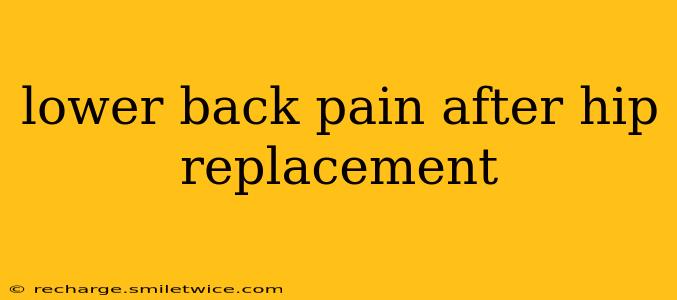Hip replacement surgery is a highly successful procedure that alleviates pain and improves mobility for many individuals. However, some patients experience lower back pain after their hip replacement. This isn't uncommon, and understanding the causes, treatments, and preventative measures can significantly improve post-operative recovery. This comprehensive guide will explore this issue in detail, addressing frequently asked questions and offering valuable insights.
Why Does My Lower Back Hurt After a Hip Replacement?
Lower back pain following hip replacement surgery can stem from several factors. It's crucial to remember that this pain is not always directly related to the hip replacement itself. Instead, it often arises from compensatory mechanisms the body employs to adapt to the changes post-surgery.
-
Muscle Imbalances: The surgery and subsequent recovery period can disrupt the delicate balance of muscles in your core and lower back. Weakness in certain muscle groups can lead to strain and pain in the lower back as it overcompensates.
-
Postural Changes: Patients often alter their posture subconsciously after hip replacement, potentially straining the back. This is especially true in the initial stages of recovery, when mobility is limited.
-
Nerve Irritation: Though less common, nerve irritation near the surgical site can sometimes radiate pain to the lower back.
-
Pre-existing Conditions: Individuals who already suffered from lower back problems before the hip replacement are more likely to experience persistent back pain post-surgery.
Is Lower Back Pain After Hip Replacement Normal?
While not universally experienced, lower back pain following hip replacement surgery is not considered unusual. Many individuals report some degree of back discomfort during their recovery. However, the intensity and duration of the pain vary significantly. Persistent or severe lower back pain should always be reported to your surgeon or physical therapist. They can determine the underlying cause and recommend appropriate treatment.
How Long Does Lower Back Pain Last After Hip Replacement?
The duration of lower back pain varies greatly among patients. For some, the discomfort subsides within a few weeks as they progress through physical therapy and regain strength. Others may experience pain for several months. Several factors influence the duration, including the individual's pre-operative health, the extent of muscle imbalances, and the effectiveness of rehabilitation. It's crucial to adhere to your post-operative care plan diligently to minimize the duration of pain.
Can Physical Therapy Help With Lower Back Pain After Hip Replacement?
Yes, physical therapy plays a vital role in managing and resolving lower back pain after hip replacement. A tailored rehabilitation program will focus on:
- Strengthening core muscles: This improves stability and reduces strain on the lower back.
- Improving posture: Correcting postural imbalances can alleviate back pain.
- Increasing flexibility: This promotes better movement and reduces muscle tension.
- Improving hip and back mobility: Gentle exercises restore range of motion.
Physical therapists will guide you through appropriate exercises, ensuring you don't overexert yourself during recovery.
What Other Treatments Are Available for Lower Back Pain After Hip Replacement?
Besides physical therapy, other treatments can help manage lower back pain:
- Medication: Over-the-counter pain relievers like ibuprofen or acetaminophen can provide relief. Your doctor might prescribe stronger pain medication if necessary.
- Injections: In some cases, injections like epidural steroid injections may be used to reduce inflammation and pain.
- Alternative therapies: Some patients find relief through alternative therapies such as acupuncture or massage therapy. However, it's crucial to discuss these options with your doctor before trying them.
How Can I Prevent Lower Back Pain After Hip Replacement?
Prevention is key. By focusing on these strategies before and after your hip replacement, you can significantly reduce your risk of developing lower back pain:
- Pre-operative strengthening: Engaging in a pre-operative exercise program to strengthen core and back muscles can prepare your body for the surgery and recovery.
- Proper posture: Maintaining good posture throughout your daily activities is crucial.
- Following your physical therapist's instructions: Diligent adherence to your rehabilitation program is vital for a successful recovery.
- Maintaining a healthy weight: Excess weight puts extra stress on your joints, including your back.
Disclaimer: This information is for educational purposes only and should not be considered medical advice. Always consult with your physician or physical therapist for any concerns regarding lower back pain after a hip replacement. They can provide personalized advice based on your specific situation and medical history.
